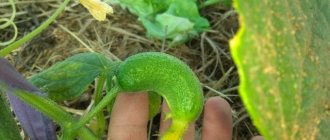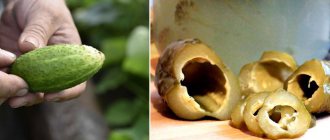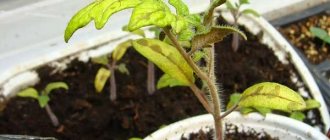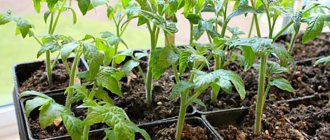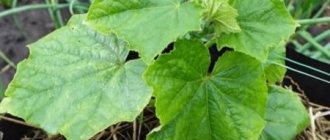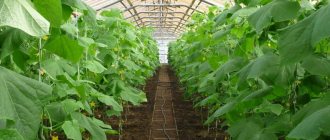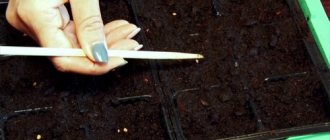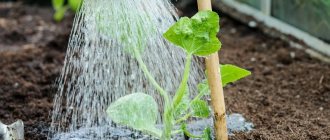Why cucumbers are bitter in the greenhouse and in the garden, what to do and what the reasons are, we’ll try to figure it out in our article. Cucumbers are one of the most common vegetables in the world. They are grown all year round: in garden beds, in winter or spring greenhouses, in open ground gardens or in greenhouses . But sometimes it happens that even the most beautiful fruits have a bitter taste.
The fruit contains the substance cucurbitacin. And when its concentration increases, the cucumber becomes bitter. Let's figure out what are the reasons why cucumbers become bitter and what to do so that the cucumbers do not grow bitter, but are tasty and crunchy.
Sources of Bitterness
At first glance, it is impossible to distinguish a sweet cucumber from a bitter one. The taste is felt only when the fruit is eaten. The source of bitterness is the substance cucurbitacin, which is contained in the fruit.
Interesting! Cucurbitacin is produced and present in all varieties and is present in the stems, fruits and leaves. But cucumbers become bitter only when the concentration of this glycoside in the vegetable exceeds.
Cucurbitacin content increases sharply when the crop is stressed. This is, to some extent, a protective reaction of the greens, which prevents pests from eating the fruits and allows the seeds to ripen.
Watch the video! Why are cucumbers bitter?
Origin of cucumbers and habitat
The cucumber was brought from hot regions of India and China. The predecessors of the domestic vegetable grew in the subtropics and had a longer and elongated shape. Now in the vastness of India you can find a wild variety of this species, but it is distinguished by its small size and bitter taste.
According to historical information, the cucumber was brought to Europe approximately 500 years before the birth of Christ. The Greeks and Romans first learned to cultivate this crop. In the chronicles there is even a city of cucumbers - Sikyon. Since then, technologies for cultivating and even salting this vegetable have appeared.
Cucumber harvest
Main reasons
There are several common causes of bitterness in cucumbers:
- insufficient humidity in closed greenhouses ;
- watering with water at too low a temperature;
- lack of potassium or nitrogen in the soil;
- excess sun rays;
- lack of sunlight due to too dense plantings;
- lack or excess of moisture, violation of regularity of watering;
- diseases of cucumber seedlings even before planting;
- planting seeds that were collected from the back of the vegetable.
Is it possible to eat bitter cucumbers?
Why are cucumbers bitter in the greenhouse? Bitter does not mean poisonous. Deficiency of potassium or sulfur or iron in fruits is not considered harmful, so the vegetables can be eaten.
Benefit
This vegetable should be on every person’s table, because it contains many vitamins. These are vitamins B, PP, E, and C. All these useful components help strengthen the nervous system, maintain the youth of the body, and increase immunity. Eating cucumbers is a good preventive measure for visual acuity. Doctors advise eating cucumbers to provide additional nutrition to the brain, which is experiencing great mental stress. Finally, these fruits are suitable for dietary nutrition.
Cucumbers contain a lot of phosphorus, sulfur, iron, calcium, sodium, fluorine, potassium, and manganese. Of course, there are fewer of these substances in bitter fruits than in properly grown ones, but they are still present.
Doctors say that bitter vegetables are also beneficial:
- Pain relief;
- Remove radiation;
- They exhibit choleretic properties;
- Have a beneficial effect on the stomach, help digestion;
- Supports the cardiovascular system;
- They have the ability to heal wounds if powdered dried skin is used;
- Good for diabetes;
- Can serve as a prevention of cancerous tumors.
Therefore, eating bitter fruits is necessary to maintain health.
Harm
Any vegetable or fruit will become harmful if eaten in large quantities. So bitter cucumbers can cause intestinal upset if consumed without measure. Also, overeating fruits will lead to the formation of gases and pain. In addition, urination will increase.
It is forbidden to eat bitter fruits if a person has the following diseases:
- gastritis;
- ulcer;
- kidney and urinary system diseases;
- problems with the thyroid gland;
- swelling.
If you have such ailments, it is better to exclude cucumbers from your diet.
In the greenhouse
Certain varieties of plants that are intended to be grown in closed greenhouse conditions are very capricious. They do not like heat and bright sunlight. But gardeners often make the mistake of placing greenhouses in places where the bright sun shines all day. That's why there are bitter cucumbers.
Due to the sharp change in temperature, between the bright sun during the day and the coolness of the night, the crop is under severe stress.
The concentration of cucurbitacin in greenhouse cucumbers increases for the following reasons:
- too much exposure to bright sunlight through the walls of the greenhouses;
- ventilation under unsuitable conditions, with a large difference between the temperature and humidity in the greenhouse and outside the room;
- disturbed humidity level;
- during the period of active growth, the temperature is incorrectly selected. Initially, it should be 18 degrees at night, and above 20 degrees during the day, and during fruiting it should not fall below +28 degrees;
- insufficient content of nutrients in the soil, which must contain nitrogen and phosphorus.
- plants become entangled and damage the vines due to the limited space of the greenhouse structure;
Tips from Mister Summer Resident
Our portal https://mrdachnik.com recommends:
- For classic varieties, the ripening time for cucumbers from the moment of pollination is 12 days. If you keep the crop on the bush longer, cucurbitacin will begin to actively form in it, due to which a strong bitterness will appear in the fruit.
- It is necessary to care for plantings depending on the growing region. Carefully monitor the condition of the soil and temperature conditions. Improper care is the main cause of bitterness.
- When preparing seeds yourself, you need to choose them away from the base of the cucumber. The closer they are located to the tail, the stronger the gene in them that is responsible for the manifestation of a bitter taste.
- Choose neighbors for your cucumbers carefully. Some crops, such as pumpkins and blackberries, cause stress in plants. As a result, the cucumber bushes will begin to experience stress, nutrients will be poorly absorbed, and bitterness will appear in the fruits.
- When preparing the soil for future plantings, you need to ensure that it is light. Doing this by adding sand is not very correct. It is best to take peat or sawdust. In such soil, the roots can easily absorb moisture and beneficial microelements.
- The best covering material for greenhouses today is polycarbonate. In addition, doors and vents can be additionally equipped with special automatic closers that will help control the temperature inside the structure. To cover the beds, it is better to choose white non-woven material.
- Spruce sawdust should not be used to increase soil aeration. They contain substances that cucumbers do not like. Pine ones are more or less suitable. But if possible, it is better to replace them with compost.
- When forming the lashes, you must prevent them from intertwining. The foliage on the upper tiers must be periodically thinned to ensure sufficient illumination for the lower ones.
- To obtain a tasty harvest, it is recommended to use a drip irrigation system, which will supply the crop with the required amount of moisture.
When the plantings have already adapted and the process of bush formation begins, it needs to be fed with nitrogen-containing fertilizers. At the fruiting stage, the bush needs additional potassium. When fertilizing the soil, you must follow a strict dosage so as not to harm the plantings. If you overdo it, there is a high chance that the harvest will taste bitter.
If your greenhouse uses devices for additional heating, you need to carefully monitor the air condition. Cucumbers love moisture and do not respond well to drought. As soon as the concentration of liquid in the air drops significantly, plants begin to experience stress. This causes cucumbers to taste bitter. To avoid this, various containers of water are placed inside the greenhouse. Additionally, you can irrigate walls and water paths.
A container placed inside the greenhouse in which plant residues are fermented will help increase the yield and improve the taste of cucumbers. This process produces carbon dioxide, which has a beneficial effect on yield and speeds up the process of filling cucumbers.
In the open ground
Why do bitter cucumbers grow in the garden ? The reasons are most often the same as in greenhouse conditions. However, there are additional factors that can trigger bitterness:
- The bitter taste comes from excess sunlight, which greenhouse vegetables will receive in smaller quantities;
- Irregular watering or too low water temperature also serves as a catalyst for the appearance of bitterness in cucumbers;
- A strong temperature change, which is not present in closed greenhouses, can contribute to an increase in cucurbitacin;
- Low-equipped beds, which are more exposed to temperature changes and do not warm up well;
- Incorrect arrangement of beds with cucumbers. Planting near blackberries, strawberries or raspberries, which are considered aggressors and take most of the nutrients from the soil.
How can you water cucumbers to prevent them from becoming bitter?
When fruiting begins, the plants are watered with special infusions. This can be an infusion of bird droppings, and compositions with nettle and dandelion herbs are also good. You need to dilute 1 part of the infusion in 10 parts of water, and then water the bushes well.
The watering pattern is also important:
- Warm water, 20 degrees;
- Watering once every three days;
- Evening time to water the plants;
- Correct portion: per bush - approximately 3-5 liters of liquid;
- Try to avoid waterlogging the area where the crop grows;
- Use the sprinkling method in addition to root watering;
- Apply fertilizers with manure;
- Do not overuse nitrogen fertilizers.
Guided by these rules, you can grow juicy and tender fruits.
Landing place
to choose a place for planting homemade cucumbers in open ground where the beds will receive diffused sunlight rather than direct sunlight. When planting in the ground, it is better to choose a place in the shade of trees or corn. Sometimes the beds are covered with spunbond, and the walls of the greenhouse are painted over with a chalk solution to obtain diffused sunlight.
You should also choose the right plant neighbors of cucumbers so that they do not take minerals and liquid from the soil.
Prevention of growing bitter cucumbers from experienced gardeners
Experienced gardeners recommend maintaining the required temperature in the greenhouse, ventilating the “house” in a timely manner, and meeting the requirements of this crop.
Rules for an experienced gardener:
- To keep the plants in diffused light, taller crops should be grown on the north side of the crop;
- The best time to plant seedlings is early May;
- The soil should be properly prepared and not watered for 14 days before planting seedlings;
- It is necessary to loosen the soil regularly;
- Watering is carried out at clearly designated times;
- It is necessary to check the bushes to prevent the emergence and spread of pests and diseases;
- All leaves that cause suspicion, as well as old ones, are removed;
- It is better to use white cloth to protect plants from the sun;
- To make the soil airy, you can introduce sawdust into it;
- For good development of the plant, you need to monitor the vines; they should not be allowed to twist.
Timely care of cucumber seedlings will allow you to achieve a good harvest.
How to remove bitterness
If you can’t cope with the reasons and the cucumbers still become bitter , you can try using a few tricks:
- Most often, only the skin of a vegetable is bitter, so the easiest way to get rid of it is to cut it off. The rest can already be eaten.
- Most often, cucumbers are bitter in the tail. You can make vegetables edible. To do this, you need to cut off the tip of the cucumber, about 1.5 cm, and rub the cut area until all the white substance comes out. After this, the vegetables are washed and they become suitable for consumption.
- There is a folk method that will help remove bitterness from cucumbers. To do this, they should be soaked in water or heat treated. With these manipulations, cucurbitacin in vegetables is destroyed and the bitter taste disappears. Soak vegetables for at least 12 hours, preferably 24 hours. The water must be changed periodically.
Cucumbers are used with bitterness and for preservation. They are often made lightly salted or added to salads.
Watch the video! Why are cucumbers bitter and how to fix it
Problems with cucumber vine
If there are a lot of old fruits on the cucumber vine, then they get the main “vitamins”, microelements and water, and young cucumbers begin to suffer from this and, as a result, become bitter. This effect occurs if the cucumber vine is damaged or twisted. In order to preserve the sweetness of new fruits, you need to cut off old ones in time, without waiting for them to grow the size of a zucchini. It is also necessary to check the cucumber vine regularly. If it is twisted, then you need to “put” it in place; if it is damaged, collect the entire crop from the damaged part and cut it off.
If all of the above conditions are met, the production of cucurbitacin in fruits will be minimal.
sunlight
Cucumbers do not like extreme heat and scorching sun. Therefore, in order not to be upset about the scarcity of the harvest, gnarled or bitter fruits, it is better to take precautions. In too hot summer months, it is advisable to whiten the film or glass of the greenhouse with a thin solution of chalk and water. In this way, the necessary shading will be provided for the stems.
Give plants more room to grow
